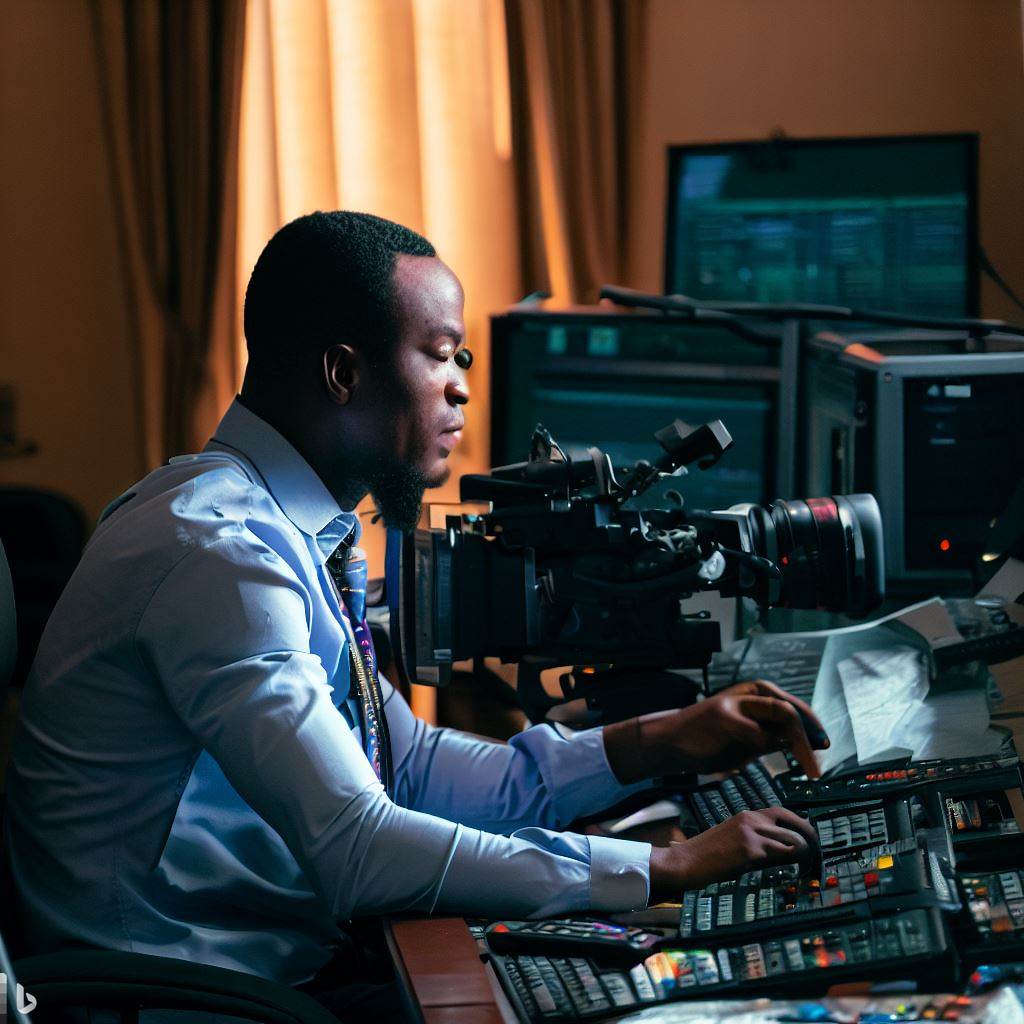Introduction
In this blog post, we will delve into the daily activities of a Nigerian TV producer, shedding light on their behind-the-scenes role.
Understanding the importance of their work is vital in appreciating the value they bring to the television industry.
Explore the intricate world of a Nigerian TV producer’s daily tasks and responsibilities.
Insight into the demanding role contributes to viewers’ appreciation and aspiring producers’ learning.
Purpose of the Blog Post
This chapter sheds light on the behind-the-scenes work of Nigerian TV producers.
- Dynamic Role: TV producers oversee planning, scripting, shooting, and post-production, ensuring cohesive content.
- Collaborative Efforts: Coordinating with directors, writers, technicians, and talent ensures smooth production workflows.
- Time Management: Juggling tasks under tight schedules necessitates efficient time allocation and decision-making.
- Creative Decisions: Balancing artistic vision, audience preferences, and budget constraints guides content creation.
- Realizing Vision: Transforming ideas into compelling television requires meticulous execution and attention to detail.
Understanding the daily endeavors of Nigerian TV producers enriches the appreciation of television content while providing aspiring producers with valuable insights into the multifaceted role.
This blog post aims to provide an insightful glimpse into the life of a Nigerian TV producer.
Background of Nigerian TV Industry
The Nigerian TV industry has experienced significant growth and impact, both within the country and internationally.
With a population of over 200 million people, Nigeria boasts a vibrant television market that caters to diverse interests and preferences.
First established in the 1960s, Nigerian television started with a single channel operated by the Nigerian Television Authority (NTA).
Over the years, the industry has witnessed tremendous expansion, driven by technological advancements and the growing demand for quality television content.
One of the key factors contributing to the growth of the Nigerian TV industry is Nollywood, the country’s booming film industry.
Nollywood has transformed the Nigerian TV landscape by producing a plethora of high-quality movies that have captured both domestic and international audiences.
In recent years, Nigerian television shows have gained significant popularity, both within the country and abroad.
Shows like “Tinsel,” “Jenifa’s Diary,” and “The Johnsons” have become household names, showcasing the talent and creativity of Nigerian TV producers.
Several Nigerian TV producers have also made a mark internationally, expanding the reach and influence of the Nigerian TV industry.
Notable producers like Mo Abudu, EbonyLife TV’s CEO, have received recognition for their work and have played a crucial role in promoting Nigerian TV content globally.
The growth of the Nigerian TV industry has had a significant impact on the country’s economy.
It has created numerous job opportunities for actors, writers, directors, and other industry professionals, contributing to the overall growth of the entertainment sector.
The Impact of the Nigerian TV Industry
The Nigerian TV industry has not only transformed the entertainment landscape but also played a vital role in shaping cultural narratives and promoting social change.
One of the key impacts of the industry is its ability to create a sense of national identity.
Nigerian TV shows often showcase the country’s diverse culture, languages, and traditions, fostering a sense of unity among the viewers.
Moreover, the industry has become a platform for social commentary, addressing critical social issues such as corruption, gender inequality, and youth empowerment.
TV shows like “Truth Be Told” and “This Is Life” tackle these issues, sparking important conversations and raising awareness among viewers.
Furthermore, the Nigerian TV industry has contributed to positive stereotypes about the country and its people.
By showcasing authentic Nigerian stories and highlighting the talent of Nigerian actors and producers, it has challenged the negative perceptions often associated with the country.
Internationally, Nigerian TV shows have gained a significant following, especially within the African diaspora.
With platforms like Africa Magic showcasing Nigerian content across the continent, the industry has become a cultural export, promoting the rich Nigerian culture and heritage.
The Nigerian TV industry has undergone remarkable growth and impact, playing a crucial role in the country’s entertainment sector and cultural development.
With its diverse range of TV shows and talented producers, Nigerian television continues to captivate audiences at home and abroad.
This industry’s growth not only fuels the economy but also promotes social change and challenges stereotypes, making it a significant force in shaping Nigerian society.
Roles and Responsibilities of a Nigerian TV Producer
Being a TV producer in Nigeria comes with a multitude of responsibilities.
It is a demanding role that requires exceptional organizational and creative skills.
Let’s delve into the primary responsibilities of a TV producer and explore the different stages of TV production.
Primary Responsibilities of a TV Producer
- Concept Development: A TV producer is responsible for creating and developing new ideas and concepts for TV shows.
- Scriptwriting: They oversee the development of scripts, ensuring they align with the show’s concept and objectives.
- Production Planning: TV producers engage in meticulous planning to determine the budget, schedule, and resources required for production.
- Casting and Talent Management: They collaborate with casting directors to choose actors and ensure the right talent is hired for each role.
- Production Coordination: TV producers oversee all aspects of production, including shooting schedules, location scouting, and equipment procurement.
- Direction and Supervision: They provide guidance and supervision to the production team, including directors, camera operators, and technicians.
- Quality Control: TV producers ensure that the final product meets the desired quality standards by reviewing footage, editing, and providing feedback.
- Post-production: They oversee the editing process, select appropriate music and sound effects, and work closely with editors to achieve the desired outcome.
- Promotion and Marketing: TV producers collaborate with marketing teams to design strategies to promote and market their shows effectively.
- Budget Management: They are responsible for managing the budget throughout the production process and ensuring resources are allocated effectively.
Different Stages of TV Production
- Pre-production: This stage involves idea conceptualization, scriptwriting, casting, location scouting, and planning.
- Production: Here, the actual shooting takes place, and all the elements come together to create the TV show.
- Post-production: After the shooting is complete, the footage is edited, sound and music are added, and special effects are incorporated.
- Marketing and Distribution: Once the show is ready, it is promoted through various channels, and distribution deals are made for wider audience reach.
Challenges Faced by Producers in Nigeria
- Financial Constraints: Limited budgets often restrict producers from fully realizing their creative vision.
- Infrastructural Challenges: Inadequate production facilities and technical resources hinder the smooth execution of TV projects.
- Regulatory Issues: Producers must navigate the complex regulatory environment, including obtaining necessary licenses and dealing with censorship rules.
- Competition: The Nigerian TV industry is highly competitive, making it challenging to stand out and attract viewership.
- Content Piracy: Copyright infringement is prevalent, leading to financial losses for producers and discouragement of original content creation.
- Changing Audience Preferences: Producers face the constant challenge of catering to evolving audience tastes and preferences.
In the end, TV producers in Nigeria shoulder immense responsibilities, from concept development to post-production and marketing.
The different stages of TV production require meticulous planning and coordination.
However, producers face numerous challenges, including financial constraints, infrastructural limitations, and regulatory issues.
Despite these challenges, Nigerian TV producers continue to contribute to the vibrant and evolving television landscape in the country.
Read: Growth Opportunities for TV Producers in Nigeria
A Typical Day in the Life of a Nigerian TV Producer
A typical day in the life of a Nigerian TV producer is filled with various tasks and responsibilities that are essential to the success of a television production.
From pre-production to post-production, every step must be carefully planned and executed to create a captivating and well-produced show.
Describe the typical daily routine of a TV producer
- The day starts early with a review of the previous day’s work and planning for the current day’s tasks.
- Meetings with the production team are held to discuss goals, schedules, and any issues that need to be addressed.
- Throughout the day, the producer oversees the entire production process, ensuring that everything runs smoothly.
- Constant communication takes place with the director, crew, and talent to ensure that everyone is on the same page.
- The producer also handles any unexpected situations that may arise, such as equipment malfunctions or scheduling conflicts.
- Throughout the day, the producer is responsible for making important decisions and providing guidance to ensure the vision of the show is achieved.
- The day ends with a review of the day’s progress and planning for the following day’s tasks.
Discuss the pre-production activities, such as scriptwriting and casting
- During the pre-production phase, the TV producer works closely with the writer to develop a compelling and engaging script.
- The producer oversees the casting process, reviewing auditions and making decisions on the best talent for each role.
- Location scouting is also a part of pre-production, as the producer must find suitable locations for filming.
- Permissions and permits are obtained, ensuring that all legal requirements are met before production begins.
- Throughout this phase, the producer collaborates with the production team to create a detailed production plan.
Explain the production process, including filming and directing
- Once pre-production is complete, the production phase begins, and the producer oversees all aspects of filming.
- The producer ensures that the director’s vision is realized, providing guidance and support throughout the process.
- Managing the production crew and coordinating with various departments, such as camera, lighting, and sound, is crucial.
- The producer also monitors the progress of filming, making adjustments as necessary to maintain the production schedule.
- Throughout this phase, the producer is responsible for maintaining a positive and productive working environment.
Detail the post-production tasks, such as editing and sound design
- After filming is complete, the producer enters the post-production phase, which involves editing and sound design.
- The producer works closely with the editor to ensure that the final cut accurately represents the intended vision.
- Sound design is another important aspect, as the producer oversees the creation of a cohesive and engaging audio experience.
- Quality control is also a part of post-production, as the producer reviews the final product for any necessary adjustments.
- Throughout this phase, the producer collaborates with the post-production team to ensure a seamless final product.
In short, the life of a Nigerian TV producer is a demanding but rewarding one.
From the early morning planning to the late-night review, every step is crucial in creating a successful television show.
The producer’s involvement in pre-production, production, and post-production ensures that every aspect of the show meets the desired standards.
Read: Becoming a Television Producer: Nigeria’s Education Path

Behind the Scenes of a Nigerian TV Production
Importance of Teamwork and Collaboration in TV Production
- Teamwork and collaboration are essential in Nigerian TV production to ensure a smooth and successful production.
- Producers, directors, writers, and all crew members work together to bring a show to life.
- Effective communication and coordination among team members help in executing the vision of the show.
- Each person involved contributes their expertise, ideas, and skills, making the final product better.
- Teamwork also helps overcome challenges and find creative solutions together.
Roles of Other Professionals in Nigerian TV Production
- Cameramen play a crucial role, capturing the visuals of the show with skill and precision.
- Editors work behind the scenes to assemble and enhance the footage, creating a cohesive story.
- Actors bring the script to life through their performances, adding depth and emotion to the show.
- Makeup artists and costumers ensure that actors look their part and fit the show’s setting.
- Sound technicians handle recording and mixing audio, ensuring sound clarity and quality in the final product.
Equipment and Technology Commonly Used in Nigerian TV Productions
- High-quality cameras and lenses are used to capture sharp and vivid images.
- Lighting equipment, such as spotlights and diffusers, helps create the right atmosphere for scenes.
- Editing software like Adobe Premiere Pro or Final Cut Pro is used to edit and enhance the footage.
- Sound equipment, such as microphones and mixers, capture and process audio efficiently.
- Green screens are used for chroma keying, enabling the addition of virtual backgrounds or special effects.
Overall, a Nigerian TV production involves a dedicated team, each with their roles and responsibilities.
Through teamwork and collaboration, they bring a show to life, using a variety of equipment and technology.
Cameramen, editors, actors, and all professionals involved contribute to the final product, making Nigerian TV productions impactful and entertaining.
Read: How Digital Transformation is Affecting TV Producers in Nigeria
Challenges and Rewards of Being a Nigerian TV Producer
The role of a TV producer in Nigeria comes with its own set of challenges and rewards. Let’s take a closer look:
Budget Constraints and Limited Resources
- Nigerian TV producers often face the challenge of working with limited budgets and resources.
- They have to find innovative ways to produce high-quality content within these constraints.
- Securing funding and sponsorships can be a constant struggle.
- Resource allocation becomes critical, and careful planning is required to make the most of available resources.
Dealing with Technical Issues and Deadlines
- Technical glitches are an inevitable part of producing TV shows in Nigeria.
- From equipment failures to power outages, producers have to handle and resolve these issues efficiently.
- Tight deadlines add to the pressure of delivering the show on time.
- Quick problem-solving skills and the ability to adapt are essential for any TV producer.
Managing a Diverse Team
- TV producers in Nigeria work with a diverse team that includes directors, writers, editors, and technical staff.
- Managing different personalities, skill sets, and egos can be a significant challenge in maintaining a cohesive and productive team.
- Effective communication, leadership, and conflict resolution skills are crucial for a TV producer to keep the team motivated and focused.
Ensuring Content Relevance and Quality
- Nigerian TV producers face the task of delivering content that resonates with the target audience.
- They must keep up with changing trends, preferences, and societal issues to stay relevant and engaging.
- Striking a balance between entertainment and educational content is a constant challenge.
- Quality control is vital to maintain the reputation of the TV production and attract a loyal viewership base.
Despite these challenges, the rewards of being a Nigerian TV producer are immense:
Satisfaction of Successfully Producing a Show
Bringing a TV show from conception to completion is an achievement in itself. Nigerian TV producers experience a sense of satisfaction and fulfillment when they see their vision come to life on screen.
Creative Expression and Collaboration
TV production allows Nigerian producers to explore and showcase their creativity. They collaborate with talented individuals across various disciplines to transform ideas into reality.
Influence on Society and the Entertainment Industry
TV producers in Nigeria have the power to shape public opinion, influence social change, and drive conversations on important topics through their content.
They contribute significantly to the cultural and entertainment landscape of the nation.
Career Growth and Recognition
With successful productions, TV producers in Nigeria can establish themselves as industry leaders.
They gain recognition for their work, paving the way for career growth opportunities, collaborations, and further creative endeavors.
In fact, being a Nigerian TV producer comes with its fair share of challenges, but the rewards and impact on society make it a fulfilling and exciting profession.
Despite budget constraints and limited resources, TV producers overcome these obstacles to create compelling content that captures the hearts and minds of viewers.
Read: The Role of TV Producers in Nigeria’s Entertainment Growth
Conclusion
This blog post provided a glimpse into the daily life of a Nigerian TV producer.
We learned about the challenging and hectic nature of their work, from planning and coordinating to directing and editing. The role of a TV producer in the Nigerian TV industry is of utmost significance.
They are responsible for creating and shaping the content that millions of viewers consume every day.
Their creativity and vision play a vital role in the success of TV shows and programs.
It is essential for us to appreciate and support Nigerian TV productions. These producers work tirelessly to bring us quality entertainment, telling our stories and showcasing our culture.
By supporting local TV productions, we not only uplift talented individuals but also contribute to the growth and development of the Nigerian entertainment industry.
So, let’s show our love and appreciation for Nigerian TV producers. Let’s watch their shows, spread the word, and engage with their content.
By doing so, we can contribute to the flourishing of our local TV industry and help create more opportunities for talented individuals in the field.
Nigerian TV productions deserve our support, and as viewers, we have the power to make a difference.
So, let’s celebrate and embrace the valuable role of TV producers in our nation’s entertainment landscape. Together, we can ensure the continued success and growth of the Nigerian TV industry.




